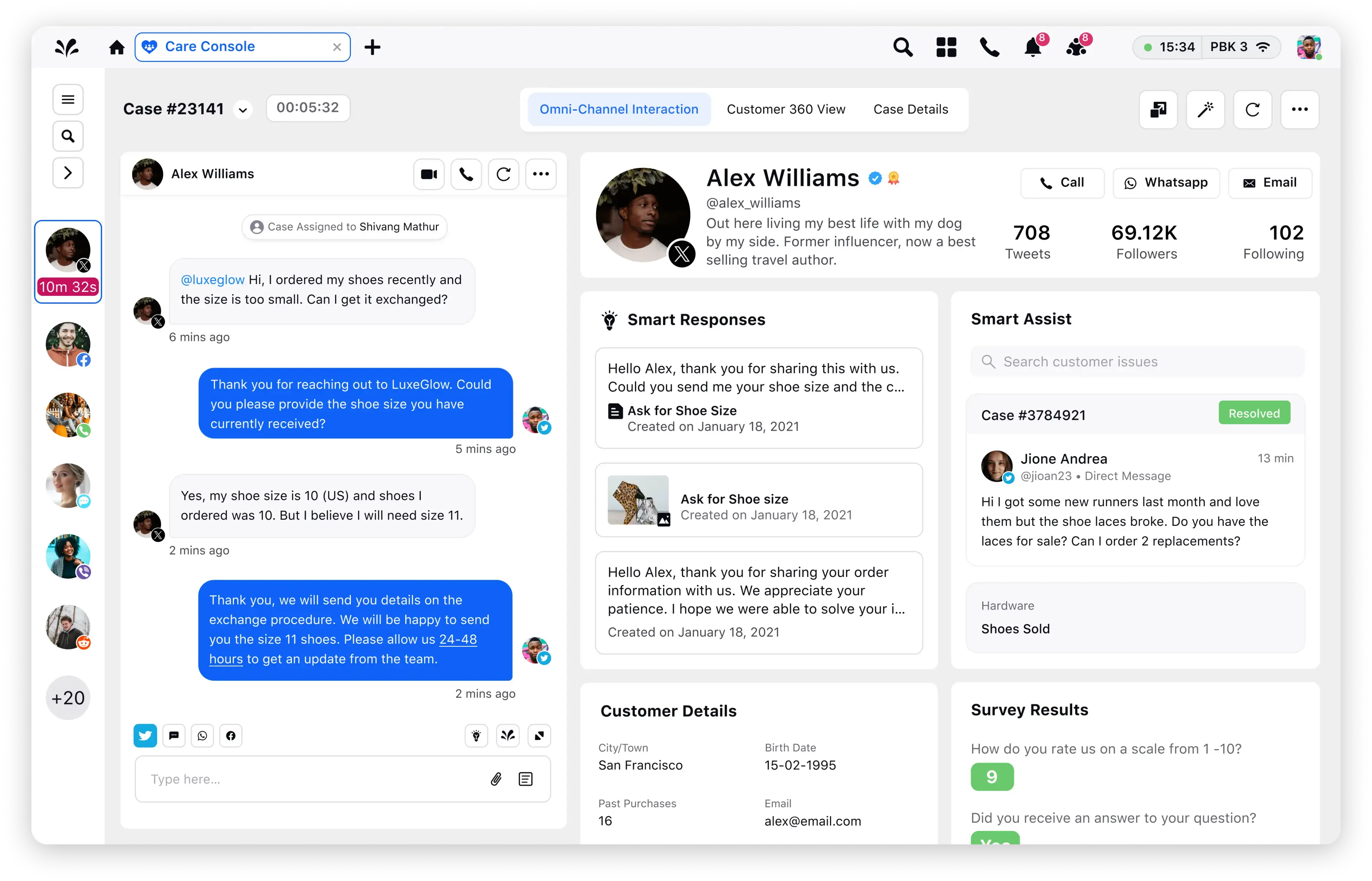The next generation of CCaaS is here
Digital-first customer service, enterprise-scale voice support. Redefine customer service with an AI-powered platform that unifies voice, digital and social channels. Power channel-less interactions and seamless resolution no matter the channel of contact.

Conversational AI in E-Commerce: Top Use Cases
In today's fast-paced world of online shopping, keeping up with the latest trends isn't just a choice; it's a must. One trend that's causing quite a stir is conversational AI and its potential in the e-commerce space.
Picture this: a new customer navigates to your e-commerce platform, curious yet cautious. With Conversational AI at the helm, their journey unfolds effortlessly. From tailored product recommendations to expert guidance through complex purchasing decisions, each interaction resonates on a human level, leaving a lasting impression long after the transaction.
However, conversational AI's transformative potential in e-commerce transcends this surface-level application. Beneath its sleek facade lies a powerhouse of capabilities, ready to tackle the most intricate e-commerce scenarios with finesse. Whether managing inventory fluctuations, resolving shipping delays, or orchestrating multi-channel marketing campaigns, conversational AI in e-commerce is poised to help you confidently navigate the complexities of this ever-evolving landscape.
In this blog, we delve into the real-world applications of conversational AI in e-commerce and how top brands leverage this technology to the fullest, driving growth and enhancing customer experiences.
Why are e-commerce brands using conversational AI
The ubiquity of conversational AI in e-commerce is a testament to its effectiveness. Here is why e-commerce brands use conversational AI today.
- Personalization across multiple devices
According to CX statistics, brands that provide a high degree of personalization gain customer loyalty, which is 1.5 times higher than brands that struggle with personalization. Conversational AI leads the charge in the e-commerce space, offering a seamless solution for delivering tailored experiences across multiple devices.
Take, for example, Stitch Fix, the online personal styling service that has mastered the art of personalized shopping. Leveraging conversational AI, Stitch Fix analyzes customer data across various devices to curate a bespoke shopping journey. By assessing customer preferences, style selections and feedback, their AI systems craft personalized recommendations that resonate with each shopper. This AI-driven personalization enhances customer satisfaction and streamlines the data analysis process, which would otherwise be time-consuming and complex if done manually.
- Analytics and forecasting
Analytics has long been essential to the growth of e-commerce brands. However, conversational AI has evolved into a predictive powerhouse, enabling e-commerce brands to forecast trends and anticipate customer needs with unprecedented accuracy.
Take Amazon, a pioneer in harnessing conversational AI for advanced analytics. By utilizing customer interaction analytics, Amazon gains invaluable insights into shopping habits and preferences, allowing it to predict future trends and tailor its offerings accordingly. This data-driven approach not only empowers Amazon to stay ahead of the curve but also ensures that it delivers products and services that resonate with its customers on a deeper level.
- Hands-free human-like interactions with voice
Voice-enabled conversational AI like Amazon Alexa or Google Nest offers users a hands-free and human-like shopping experience. For example, your customers can just speak out loud to order a gift for their friend's birthday. This integration of voice technology into the shopping process makes it easier and more convenient for everyone to find what they need and place orders effortlessly.
But it's not just about convenience. Voice interactions can benefit individuals with disabilities, providing them with a vital connection to e-commerce platforms and services that may otherwise be challenging to access. With features like Alexa's dynamic pacing, text-to-speech capabilities and automatic modulation of voice tones, the conversational experience is more natural, enhancing customer engagement and satisfaction.
Good to know: Advanced voice bots from Sprinklr offer auto modulations, dynamic pacing and expressive text-to-speech, empowering you to create compelling and human-like interactions with your customers effortlessly. Plus, by delivering customer self-service options, personalized interactions and easy transfers to live agents, Sprinklr voice bots give your contact center the capabilities to serve customers instantly, 24/7, at scale, all at a fraction of the cost of live agents.
- Fraud detection
Conversational AI in e-commerce can help detect fraudulent activities to protect your business and customers. PayPal, for instance, employs conversational AI to detect and prevent unauthorized transactions by flagging suspicious communication patterns and typical inconsistencies that may suggest fraudulent activities. Furthermore, conversational AI in e-commerce verifies customer information before purchase, reducing the risk of false orders or payment fraud.
How Sprinklr AI+ helps
In an age where data breaches and privacy concerns are at an all-time high, Sprinklr AI+ stands as a trusted ally, empowering you to mitigate risks and uphold the highest standards of data security and governance.
By masking critical information such as dates, times, email IDs, URLs, IP addresses, and even driving licenses and medical license numbers, Sprinklr AI+ provides a comprehensive shield against potential threats and unauthorized access.
Also, what sets Sprinklr apart is its regex masking capabilities, which allow for tailored data masking solutions to meet specific customer requirements. Whether it's industry-specific regulations or internal data protection policies, Sprinklr AI+ can seamlessly accommodate diverse needs, ensuring contact center compliance and peace of mind.

How e-commerce brands use conversational AI: Examples
Conversational AI is at the top of every marketing and business strategy team's wish list, from online retailers to established brands. Here are a few popular brands that have used it to great success.
1. Sephora
The renowned French beauty giant Sephora is at the forefront of innovation in the beauty industry, revolutionizing how customers discover and purchase products through its intelligent virtual agent, Sephora Virtual Artist.
Imagine receiving personalized beauty consultations, recommendations tailored to your skin type and preferences, and even virtually trying on makeup using augmented reality technology—all from the comfort of your own home. That's exactly what Sephora's Virtual Artist delivers, seamlessly integrating conversational AI into the customer journey to elevate the shopping experience to new heights.
But the impact goes beyond just convenience. Sephora's conversational AI platform has fostered a strong fan following, with customers lauding the brand for its innovation and commitment to personalized service.
2. Pizza Hut
By leveraging chatbots on platforms like Twitter, Facebook Messenger, and Amazon Alexa, Pizza Hut has transformed customers' interactions with its brand.
These chatbots empower customers to easily reorder previous orders, explore popular menu items and seamlessly link their social media accounts to Pizza Hut accounts for a more personalized experience. With support for delivery or carryout options from nearby locations, Pizza Hut's chatbots streamline the ordering process, making it faster and more convenient than ever before.
But the impact doesn't stop there. Pizza Hut's integration of conversational AI into its digital customer service has delivered significant results. For example, introducing a mobile-friendly web app resulted in a notable 30% increase in conversions. Customers appreciated the faster, more enjoyable and efficient pizza ordering process facilitated by this initiative.
3. Shopify Sidekick
Dubbed the "ChatGPT for e-commerce merchants," Shopify Sidekick harnesses the power of conversational AI to assist users with tasks related to Shopify's functionality and business management.
From setting up discounts to summarizing sales data and even modifying Shopify-focused shop designs, Shopify Sidekick is a versatile tool that efficiently empowers users to tackle time-consuming and repetitive tasks. By leveraging the technical prowess of conversational AI, Shopify Sidekick molds itself to the unique needs of each user, offering personalized assistance tailored to their specific requirements.
4. H&M
H&M is leading the way in retail innovation by introducing AI chatbots that serve as virtual stylists. Their chatbot engages users in a style quiz to curate personalized outfit recommendations based on their responses. The chatbot adapts to users' preferences by offering alternative outfits if they dislike a suggested option and suggesting complementary clothes and accessories if they approve of an outfit. With its exceptional intelligence, H&M's chatbot feature has redefined online shopping, making it more personalized, interactive and enjoyable.
5. Walmart
As one of the world's largest retailers, Walmart has embraced conversational AI to enhance its customers' in-store shopping experience. With the introduction of its voice-activated intelligent virtual agent, Walmart Voice Order, customers can effortlessly add items to their cart, reorder products and even receive personalized recommendations simply by using voice commands. By harnessing the power of conversational AI, Walmart has simplified the shopping process, increased convenience and strengthened its competitive edge in the e-commerce landscape.
Bonus Read: 13 Examples of Good Customer Service for Your Business
Explore Sprinklr conversational AI platform, built for modern e-commerce
In the fast-paced world of e-commerce, success hinges on more than just offering quality products or services—it's about delivering exceptional customer experiences that keep shoppers returning for more. However, navigating the complexities of customer engagement and support can often feel like an uphill battle, with challenges ranging from managing multiple channels to meeting the ever-evolving expectations of modern consumers.
This is where Sprinklr's Conversational AI platform steps in, offering a comprehensive solution to alleviate the pain points that plague e-commerce businesses. With Sprinklr conversational AI platform, you can:
🚀Create and launch your generative AI-powered bots in minutes.
🎧Offer automated customer service across your chosen channels, including voice and chatbots, ensuring a seamless omnichannel experience.
💬Deliver tailored responses based on a comprehensive understanding of customer profiles, reducing response and resolution times through smart replies and pre-set responses.
📊Analyze customer conversations across more than 20 channels, optimizing future responses and enhancing customer engagement through conversation analytics.
We've witnessed promising initiatives lose momentum. Don't settle for the ordinary when it comes to conversational AI.
Frequently Asked Questions
Conversational AI seamlessly integrates with existing e-commerce platforms by embedding chatbots or virtual assistants into websites or mobile apps. Integration involves connecting conversational AI systems with backend databases and APIs to access product information, inventory data, and order processing systems, ensuring a seamless shopping experience for users.
Privacy and security are paramount concerns in e-commerce, and Conversational AI addresses these issues through stringent data protection measures. AI-powered chatbots adhere to strict privacy regulations and encryption standards, ensuring secure handling of sensitive customer data such as personal information and payment details. Authentication protocols, encryption algorithms, and regular security audits are implemented to safeguard user privacy and prevent unauthorized access or data breaches.
Implementing Conversational AI in e-commerce poses several challenges, including natural language understanding, context awareness, and maintaining conversational flow. AI algorithms must accurately interpret user queries, understand context, and provide relevant responses in real time. Additionally, integrating chatbots with existing systems and workflows, ensuring compatibility with diverse platforms and devices, and addressing scalability issues are critical considerations.




